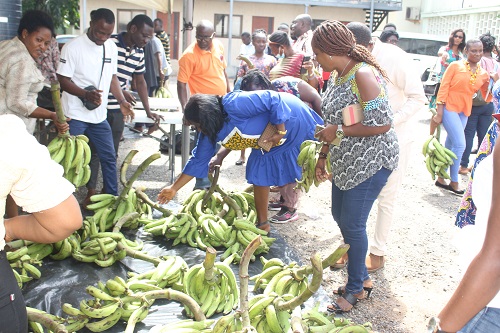Despite the intervention by the Ministry of Food and Agriculture to bring some food items from the farm gates to its head office and make them more accessible to the people, the reduction in fuel prices at the pumps, as well as the cedi gaining strength against the dollar, prices of food items remain largely high, a few days to Christmas.
Although the heavy vehicular and human traffic that is characteristic around this time is evident and there is a lot of human movement at the various markets in Accra, many traders are complaining of low patronage of their wares.
Sales strategy
This has resulted in some of them adopting sales strategies to attract customers.
For instance, instead of wholesale, many are adopting the retail strategy to sell their various items.
Others are making sure that they are able to spot potential buyers from a distance and convince them to their shops to patronise their items.
Also, some are using music to attract potential buyers.
Survey, prices
There are marginal price differentials at the various markets.
A market survey by the Daily Graphic established that the prices of the usual essential food items (rice, chicken, cooking oil and tin tomatoes) consumed during the festivities had more than doubled at some major markets in the Greater Accra Region, including the Agbogbloshie, Kaneshie, Makola, Mallam and Madina markets.
Currently, a bag of rice (25kg) is hovering between GH¢400 and GH¢650, depending on the brand.
A five-litre gallon of edible oil that was sold at GH¢80 the same time last year is now GH¢185; with the five-litre Sunflower oil currently selling at GH¢210, as against GH¢100 last year, while cooking oil in the big gallon, popularly called the ‘Kufuor gallon’, is GH¢550, as against the GH¢280 it was sold for last year.
Also, imported frozen chicken which sold at GH¢14 per kg is now going for GH¢35; live broiler chicken that was offered for between GH¢70 and GH¢90 in 2021 is now priced between GH¢130 and GH¢150, with layer birds now selling at GH¢70, a 75 per cent jump from the GH¢40 it was sold for last year.
A crate of eggs, depending on the size of the eggs, is going for between GHc40 and GHc55. Last year, it was sold for between GHc18 and GHc24.
Market visit
Some traders who interacted with the Daily Graphic team indicated that the prices of food items quadrupled in late November when the cedi was about GH¢15 to a dollar.
we have sufficient food in the system, but the challenge is how to cart the produce from the farm gate or production point to the big markets in Accra, Kumasi and other urban centres where the demand is high.
“This is because the cost of transportation, influenced by rising fuel prices, has affected the food supply chain, and that is why the Ministry of Food and Agriculture has introduced an initiative to start selling foodstuffs on its premises in Accra,” he added.
Let’s boost local production
In sharp contrast, the General Manager of Wilmar Africa Limited, Kwame Wiafe, whose firm is into local agro-processing, said the local production of rice and edible oil was rather limited.
That, he said, was because the status quo had not changed and that the activities of importers of the two products were still posing a threat to local producers.
He, therefore, underlined the need for the government to work closely with stakeholders in the agricultural value chain to help boost local production in a sustainable manner.
To boost rice production, for instance, he said, the government should partner all stakeholders to ensure that farmers or producers produced quality and well-packaged products consistently for the market.
He said there was also the need to build strong distribution channels, coupled with an intensive campaign to promote and encourage the consumption of Ghana-made rice.
“If the government and other stakeholders work together in the long term, we will be able to produce food items such as rice and edible oil in a sustainable manner for the market.
“We need to see more effort from the government to boost local production. Sometimes when we find ourselves in economic difficulties of this nature, we often make various positive pronouncements to scale up local production, but as soon as we are out of the woods, we tend to forget,” he said.














